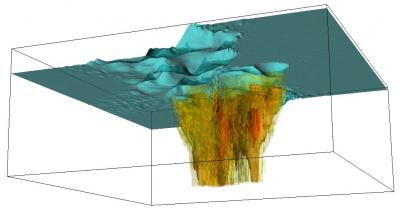SCIENCE
Sophisticated SuperComputer Modeling Among Tools To Help CARTHE Study Fate of Hydrocarbons from Oil Spill
Lead investigator Tamay Özgökmen heads team, more than $15 million allocated to project by GRI
The Gulf of Mexico Research Initiative (GRI) announced yesterday that eight research consortia will be funded for a total of $112.5 million over three years to support research that will investigate the fate of petroleum in the environment from the Deepwater Horizon, the impacts of the spill, and the development of new tools and technology for responding to future spills and improving mitigation and restoration. The University of Miami (UM) will serve as lead institution on the Consortium for Advanced Research on the Transport of Hydrocarbons in the Environment (CARTHE), under Lead Investigator and UM Rosenstiel School of Marine & Atmospheric Science Professor Tamay Özgökmen.
The goal of the UM-led team is to accurately predict the fate of hydrocarbons found in crude oil that were released into the environment, helping to guide risk management and response efforts to minimize damage to human health, the economy and the ecosystem. Partners in this activity will include scientists from City University of New York - Staten Island, Florida International University, Florida State University, Naval Postgraduate School, Naval Research Laboratory, Nova Southeastern University, Texas A&M University-Corpus Christi, Tulane University, University of Arizona, University of Delaware and University of Texas at Austin.
"The Deepwater Horizon oil spill is one of the most significant oceanographic events of our life time, and it is so challenging that it demands many types of modelers, observational scientists, biologist and chemists to all work together to unravel what really happened," said Özgökmen, a professor of Meteorology and Physical Oceanography at UM. "This event is like the Moon Mission for oceanography -- an important and challenging problem with immediate social impact. This is the kind of focus that brings scientists together."
CARTHE is comprised of a total of 26 principal investigators (PIs) from 12 universities and research institutions distributed across four Gulf States and in four other states. UM, as the lead institution has 13 PIs on the project, Shuyi Chen, Mark Donelan, Annalisa Griffa, Brian Haus, Angelique Haza, Mohamed Iskandarani, Arthur Mariano, Josefina Olascoaga, Ad Reniers, Ashwanth Shrinivasan, Ge-Cheng Zha, and Javier Beron-Vera.
"It was amazing how easy it was to assemble the CARTHE team; it was a matter of looking at our own expertise, then calling on colleagues from other institutions for the missing pieces of the puzzle. Everyone was ready and eager to put our ideas together within days. Now, we are all looking forward to working together, and getting starting on this new project, as well as collaborating with other consortia funded by the GRI."
The grants awarded today were in response to a request for proposals the GRI Research Board issued on April 25, 2011. This request for proposals solicited applications from Research Consortia - groups of researchers with compatible expertise from four or more institutions - to address one or more of the five intellectual themes: 1) Physical distribution, dispersion, and dilution of petroleum, its constituents, and associated contaminants under the action of physical oceanographic processes, air-sea interactions, and tropical storms; 2) Chemical evolution and biological degradation of the petroleum/dispersant systems and subsequent interaction with coastal, open-ocean, and deep-water ecosystems; 3) Environmental effects of the petroleum/dispersant system on the sea floor, water column, coastal waters, beach sediments, wetlands, marshes, and organisms, and the science of ecosystem recovery; 4) Technology developments for improved responses, mitigation, detection, characterization, and remediation associated with oil spills and gas releases; and 5) Fundamental scientific research integrating results from the other four themes in the context of public health.
In addition to the scientists working on CARTHE led by UM, a handful of scientists from the University of Miami are involved in projects led by other institutions. A team consisting of Lynn "Nick" Shay, Villy Kourafalou and Mohammed Iskandarani and Ashwanth Srinivasan will participate in the Florida State Univeristy-led Deepsea to Coast Connectivity in the Eastern Gulf of Mexico (Deep-C). Additionally, faculty member Claire Paris is modeling the fate of petroleum in the environment as part of the Center for Integrated Modeling and Analysis of the Gulf Ecosystem (C-IMAGE) led by the University of South Florida.
The GRI Research Board is an independent body established by BP to administer the company's 10-year, $500 million commitment to independent research into the effects of the Deepwater Horizonincident. Through a series of competitive grant programs, the GRI is investigating the impacts of the oil, dispersed oil, and dispersant on the ecosystems of the Gulf of Mexico and the affected coastal States in a broad context of improving fundamental understanding of the dynamics of such events and their environmental stresses and public health implications.

